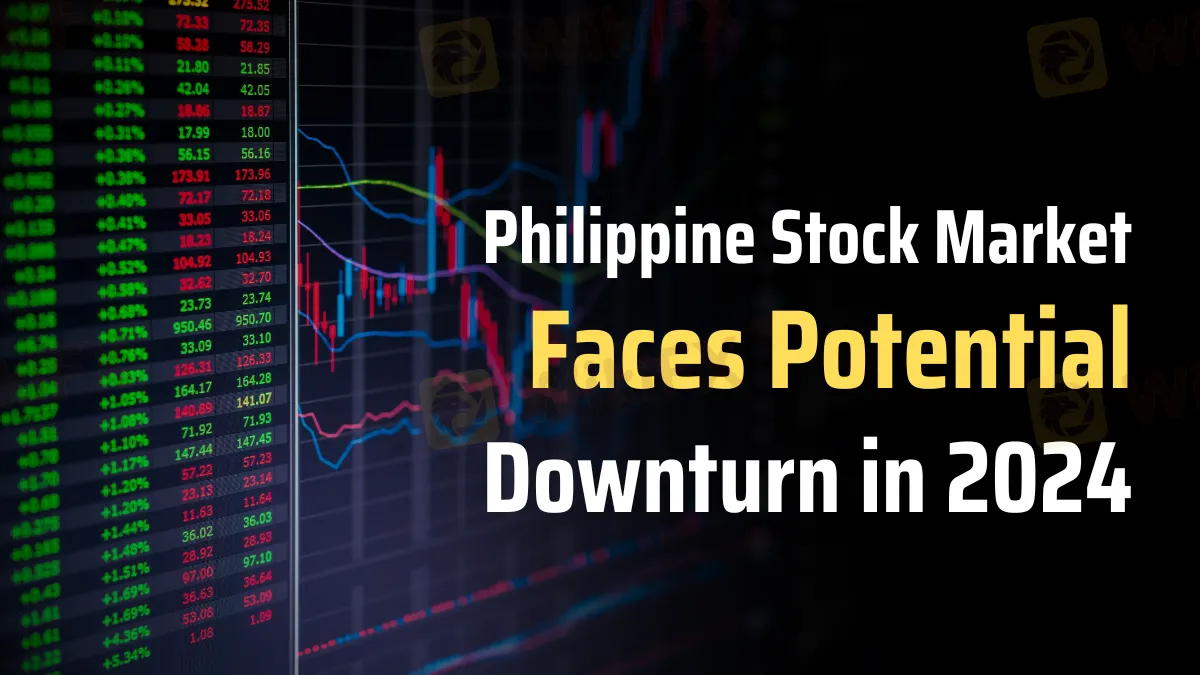Philippine Stock Market Faces Potential Downturn in 2024
Abstract:The Philippine stock market's early gains in 2024 are waning, raising concerns about a potential downturn amid rising geopolitical risks and currency volatility.

The Philippine Stock Exchange Index (PSEi) began 2024 with confidence, rising as high as 9.6% in the first quarter. However, this early boom looks to be slowing, prompting fears about a likely market crash this year. Over the last four years, there has been a similar trend of big early gains followed by large drops by the end of the year.
In 2020, the PSEi rose 1% in January but fell 8.7% for the year, owing mostly to the COVID-19 pandemic. Similarly, 2021 began promisingly, with a 4% gain in the first two weeks, but ended with a 0.2% loss. This trend was replicated in 2022 and 2023, with initial increases of 1.8% and 7.4%, respectively, but both years ended with negative returns of 7.8% and 1.8%.
The rising possibility of a down cycle is a major contributor to the market's present volatility. Investors are urged to take a more cautious strategy, focusing on diversification and risk control. Geopolitical tensions, especially the danger of intensifying wars, offer a significant risk to the global economy, with the ability to disrupt commerce, raise energy prices, and strain international relations. Such shocks may move investor sentiment away from stocks and toward safer assets such as bonds.
Currency volatility is another significant element impacting the stock market. The Philippine peso recently fell below P58 versus the US dollar, increasing market susceptibility to future currency volatility. In reaction, the Bangko Sentral ng Pilipinas (BSP) may be forced to boost interest rates to fight speculative trading and associated inflationary pressures. Within a month, the yield on 10-year Philippine bonds increased from 6.33% to 7.04%, suggesting that the market expects higher interest rates.
Related news:

Higher interest rates may worsen financial risks, especially considering the growing debt levels of publicly traded corporations on the PSE. The ratio of total debt to entire market capitalization has risen dramatically throughout the years. In 2007, this ratio was 12%, but by 2019, it had risen to 50.2%, and it now stands at 63.2%. This increased debt load, together with possible interest rate increases, presents significant concerns to market stability.
Although certain equities, particularly blue chips, have fallen to historically low levels, there is no assurance that the market will not fall lower. The historical record of the Buffett indicator, which compares the stock market's total market capitalization to GDP, indicates that the market may stay “undervalued” for an extended length of time. Currently, the Buffett indicator is at 71.9%, which is below the 75% level that normally indicates an undervalued market.
History demonstrates that a low Buffett indicator does not always result in a rapid market rebound. For example, during the 2008 global financial crisis, the PSEi lost more than 30% of its value, lowering the Buffett indicator to 43.2%. It took two years for the market to begin climbing again.
Conversely, when the indicator exceeds 90%, suggesting an overpriced market, there is not necessarily a swift correction. This was obvious in 2007, when the index peaked at 106% and the market continued to rise for over a year.
Geopolitical risks, currency volatility, increasing interest rates, and high corporate debt ratios all contribute to the Philippine stock market's complexity. Investors should proceed with prudence during this moment, focusing on diversification, risk management, and a focus on financial fundamentals.
The Philippine stock market's endurance in the face of previous setbacks provides some optimism, but the road to recovery may be longer and more difficult than expected. As the market navigates these volatile times, a cautious investing plan will be critical to reducing risks and ensuring consistent returns.
You may also access the latest news in the Financial market here.

Read more

JPMorgan Expands Rapid Forex Settlements with JPM Coin Blockchain
JPMorgan to offer instant USD/EUR settlements via JPM Coin, with plans to include GBP. Blockchain tech aims to streamline forex for fintech firms.

Saxo Singapore Discontinues SaxoWealthCare and SaxoSelect
Saxo Singapore will discontinue SaxoWealthCare and SaxoSelect by December 2024, advising clients to withdraw funds and offering alternative investment options.

SEC Seeks to Dismiss Kraken's Defenses in Legal Case
The SEC intensifies legal action against Kraken, arguing the exchange operates as an unregistered securities platform. Kraken fights back with multiple defenses.

Caroline Ellison Begins Two-Year Sentence for FTX Scandal
Caroline Ellison, former CEO of Alameda Research, begins a two-year prison sentence for her role in the FTX fraud, following her guilty plea and testimony.
WikiFX Broker
Latest News
US Presidential Election in Overdrive: Exploring Forex Wealth Codes with WikiFX App
Do You Really Know Your Trading Game?
CySEC Tightens Compliance Rules for Crypto and FX/CFD Brokers
Will Trump's reelection drive more market growth?
How U.S. Elections Have Influenced Financial Market Trends Since 2000
Zenstox: A Trader’s Nightmare? An Inside Look at Alleged Scams and Unethical Practices
eToro sponsors the Bitcoin Mena Conference
FCA WARNING AGAINST Touchstone Markets
Caroline Ellison Begins Two-Year Sentence for FTX Scandal
FCA Convicts 2 Individuals from CCX Capital & Astaria Group in £1.5M Crypto Scam
Rate Calc

